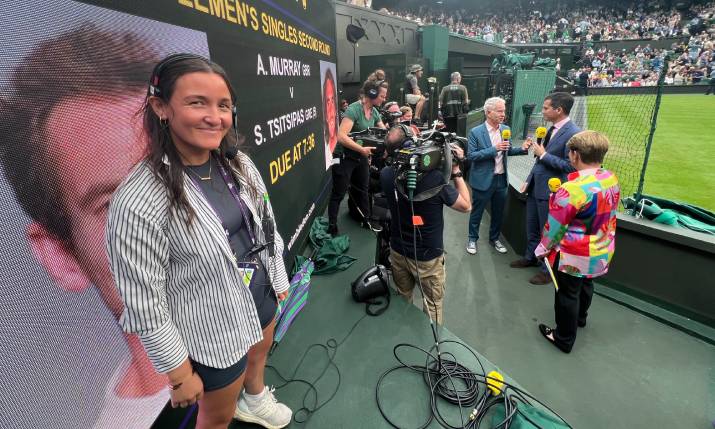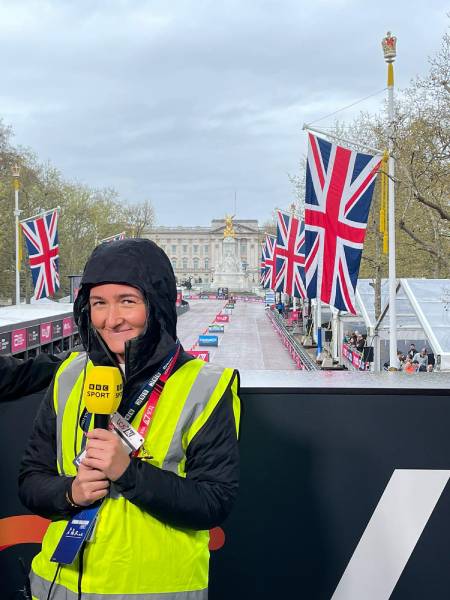Stepping Stones: BBC operations engineer Emily Hunter talks maintaining, monitoring, installing and rigging

Emily Hunter, a BBC operations engineer, assisting the sound team at Wimbledon 2023
Emily Hunter is a BBC operations engineer who is involved in installing and rigging as well as maintaining and monitoring equipment for major productions such as the Commonwealth Games. She loves her job and her story is one of our series of Stepping Stones articles, which showcase young women moving up the ladder behind the camera in sports broadcasting.
What is your job role today and what do you love about it?
I am currently working as an operations engineer in the BBC’s Technology Operations Department in Salford. As a team, we provide 24 hour operational support to both radio and TV sport productions. I love my role as I constantly get to work on new projects, and I am always learning something. I love to be able to work within a team whilst having the authority to be able to make quick decisions and think creatively under pressure.
What does your current job entail on a day to day basis?
Maintaining, monitoring and supporting radio and TV studios equipment, whilst occasionally installing and rigging new equipment for major sporting events such as the Commonwealth Games.
“Talking to people is my biggest tip. Having good communication skills with a variety of people, including my course mates, managers and other engineers who I worked with daily, enabled me to learn from others’ experiences”
Day to day, problem solving is the main responsibility in my role. We are continuously faced with errors that having varying degrees of urgency. These can range from faulty headphones to broken fader panels on sound desks. The aim is to keep broadcast continuity and minimise disruption to the BBC’s services.
Throughout the whole process, we update logs of errors and faults. This is used as a communication tool, to keep all those up to date with the progress of the work. Additionally, they are beneficial for the engineers when reoccurring faults happen, as the resolution method can be followed, and the issue can be escalated to the second line specialists if required.

BBC operations engineer Emily Hunter testing mics and cameras with the OB trucks at the London Marathon April 2023
Can you talk us through your relevant education that helped you break into the sports broadcasting industry?
I completed A-Levels in Maths and Computer Science, which allowed me to apply for the Broadcast Engineering Degree Apprenticeship at the BBC. I knew I wanted to follow an engineering path because of my passion for problem solving and an interest in fault finding.
Throughout my apprenticeship I completed all the relevant university modules and worked with a variety of engineers from different backgrounds to learn different techniques to fault finding with problematic broadcasting equipment. The apprenticeship offered me the chance to develop my knowledge through a hybrid of theoretical classroom learning and valuable on-the-job practical experience.
How did you get your first job in sports broadcasting, what was the role, and when?
The first time I had experience working with sports broadcasting was in my final year of my apprenticeship whereby I completed my dissertation on the replacements of ISDNs. These are used regularly by BBC Sport for audio contributions into their programmes but are quickly being replaced by IP solutions.
As part of my dissertation, I explored IP technologies for BBC Sport and conducted a variety of tests to compare the performance of the equipment available. In this final placement I was fortunate to spend time on a range of outside broadcasts: the FA Cup Final at Wembley, Match of the Day, TCS London Marathon, Queen’s Club Tennis and Wimbledon. I predominantly spent time with the onsite sound teams, working with the sound supervisors, communication engineers and sound assistants.
What happened next to get you where you are today?
I have been an advocate for apprenticeships and graduate schemes being the way for creative individuals to gain experience and get into broadcasting roles. I have been to Rise networking events and have taken part in BCOMS outreach programmes to spread awareness of the schemes and give tasters into what working in the industry is like.
After graduating, I realised that I wanted to develop my skills across the whole broadcast chain before focusing into a more niche role. Working as an operations engineer allows me to gain a vast amount of experience and training in all fields of the industry.
What job would you like to be in five or 10 years time? What are your career goals?
In the next few years, I would like to be more confident and hopefully specialise in an audio specific role, with a focus on comms and audio engineering. I aspire to enhance my knowledge by exploring major sporting event productions within the outside broadcast environments. This is because outside broadcast rigs require quick thinking and adaptable workflows.
In addition to transitioning into a more specialised role, I would also like to be involved with research and development of new broadcast technology to improve efficiency and streamline production. Another ambition of mine would be to help those who are looking into getting into the industry and would like to uphold the role as a WiSTEM ambassador.
Can you give us some top tips that really helped you get where you are today?
Talking to people is my biggest tip. Having good communication skills with a variety of people, including my course mates, managers and other engineers who I worked with daily, enabled me to learn from others’ experiences. I was able to ask appropriate questions and get involved with a variety of opportunities.
In addition to networking, I think it helps to be organised and proactive, especially when juggling university and apprenticeship work. I found it extremely beneficial planning ahead and setting personal deadlines to give myself some buffer time and flexibility, as everything can change last minute in sports broadcasting. In my experience, it helped to be organised and proactive with my apprenticeship deadlines to give me the opportunity to work on extra sporting events.
Another thing I have found useful in my career so far is to overestimate how long it will take to do something, this has helped to relieve the pressure. But also looks very good to those you are reporting to when you have finished earlier than you said you would!
Can you give us some tips on things not to do or to avoid when trying to get a role you really want?
My advice would be to avoid being put off by specific requirements when applying for a role. If the hiring team can see the passion and enthusiasm in an individual, they will be willing to train and support you to develop and improve the skills that you will need for the position. Don’t doubt yourself, show the hiring team that you can work logically through problems and can work well under pressure. Avoid being narrow minded about solving issues, work collaboratively as a team and take everyone’s ideas into consideration as there will probably be multiple different solutions.
What would you say are the barriers to getting a job in the broadcast industry?
It’s quite hard to find experience in specific areas in the broadcast industry, but a lot of the skills utilised are transferable. Specifically for degree apprenticeships they’re very competitive and desirable to lots of different people, but there’s no harm in applying (and to multiple different ones, or the same one year on year).
There’s only limited number of jobs available and their openings are sparse, for those looking at getting into a specific position might be worth applying for other roles within broadcasting to get into the industry and meet people; this also opens up any internal opportunities in the future too.
What would you recommend to other people thinking of working in the broadcast industry?
Try and find some experience, see if you can shadow people in the broadcasting industry or go along to an outreach day. This will allow you to have a little insight into working in broadcast and to see if it works for you.
Talk to people at careers events to see what it’s like and ask any questions you might have.
Show your passion, and for engineering roles, stay up to date with new technologies and innovations by reading articles such as those written by SVG Europe, the European Broadcasting Union, Broadcast Now and following broadcasting news on LinkedIn.

